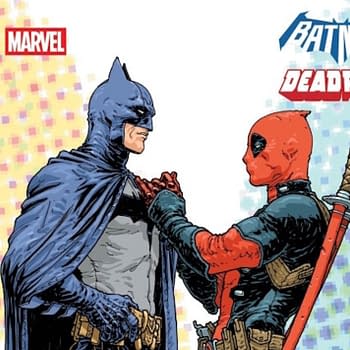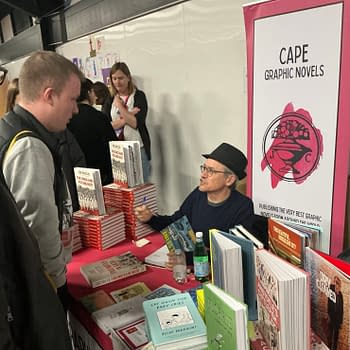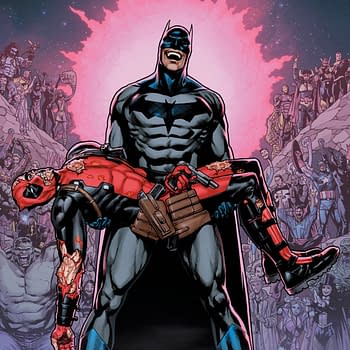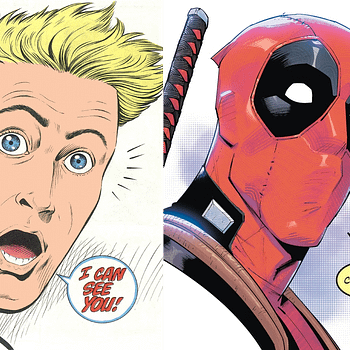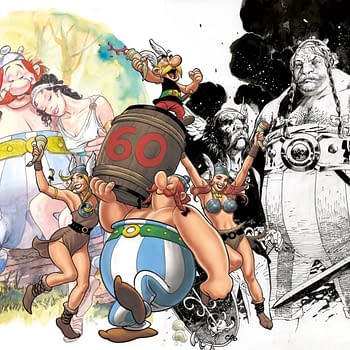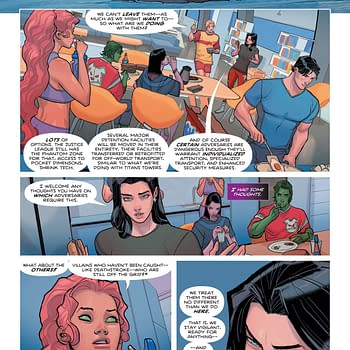Posted in: Comics, Recent Updates | Tagged: batgirl, comic con, Comics, dc, san diego, stephanie brown
Geek Girl On The Street Reports: Where Are The Women In Superhero Comics?

One of the most interesting stories San Diego Comic Con this year was that of the "Batgirl of San Diego" – a Stephanie Brown Batgirl cosplayer who grilled DC executives at panel-after-panel about the lack of both strong female superheroes and the lack of female creators in the DC universe.
The direct result of her actions (which were not always met with the approval of the SDCC audiences in attendance with her) was that Dan DiDio and Jim Lee posted on the DCU blog that they are committed to seeking out, supporting and publishing female driven superhero titles post the day-and-date relaunch.
It is an interesting consideration that while the amount of highly visible female comic creators has increased substantially over the last decade, that in companies like DC and Marvel woman creators represent less than 1% of the workforce. Further, there are exponentially less female superheroes than there are male superheroes – to support that, name the first five superheroes which come to your mind:
(Mine are Superman, Batman, Spider-Man, Captain America and Wonder Woman.)
Of course, there are many other awesome female superheroes other than Wonder Woman. And, I'm not trying to imply otherwise. The truth of the matter, though, is that really are more dude capes than lady capes – it's just the numbers. Why is that?
Many speculate that the reason there is a lack of both female superheroes and female creators of superheroes, in general, is because women aren't "that interested" as a whole in superhero comics.
This is patently untrue. There are a lot of talented female creators out there who want to work for companies on superhero titles. And, the Batgirl of San Diego illustrates that there are a lot of devoted female superhero fans out there, dying to have titles which reflect their world to read.
Somewhere a disconnect is happening between creators-fans-publishers and I'm curious to explore where and why that's happening.
This is part one in a series of ongoing conversations with women (and, a few key men) about women in comics and comics about women. In the coming weeks you can look for interviews with Louise Simonson, Amanda Connor, Danielle Corsetto and other comic creatin' ladies in which we talk about their experiences as women in the male dominated comics industry. To start off with, here is an interview with "The Batgirl of San Diego" – the lady who started this whole conversation… To protect the privacy of her family, we will only refer to her by her Twitter screen name, Kyrax2:
When did you start to get into comics?
Kyrax2: About three years ago when I was searching for more information on Batman the Animated Series and the related shows. Actually, it was about three and a half years ago that I found the other television shows in the same universe: Superman the Animated Series, Justice League, Justice League Unlimited, Batman Beyond. While searching for more, I also discovered a whole bunch of comics that were set in the same universe. Batman Adventures, Batman and Robin Adventures, Gotham Adventures and a bunch of other ones, as well, for the other animated series. And, the Batman ones in particular were excellent. That was about three years ago that I discovered those and I read all of them, I sought them out in paper form because I loved them all so much. From there it wasn't too difficult to step into the main DC Universe.
Do you read any independent comics?
Kyrax2: At the convention, in fact, which is funny because a lot of people said afterward, kind of condescendingly, "Maybe you should go look for some independent comics." And for two days a friend of mine and I had been hanging out in the independent comics area of the SDCC Dealer's room, and between us, we spent several hundred dollars on independent comics.
It was just this kind of idea like "Oh honey, maybe you should branch out." You know what I mean?
Where did the idea to dress as Batgirl and to grill Dan DiDio come from? What was the tipping point or the crucial moment which made you say "Hey I don't like what's going on at DC and I'm going to say something about it to someone who might be able to fix it."
Kyrax2: Well, about the idea to dress as Batgirl – this is not my first convention, it's my first San Diego Comic Con, but I was heavily into anime before I got into comic books, I've been into anime since 1999. I've been to quite a few anime conventions and I've cosplayed at most of them.
So you're no stranger to cosplay is what you're saying?
Kyrax2: That is a fact. I really enjoy dressing up. And, one of my favorite characters right now is Stephanie Brown as Batgirl. I just think she's really cool, really funny and she goes out there and she just keeps going. I really wanted to dress up as her. This past year I was doing things like working out and losing weight with [cosplaying Stephanie Brown as Batgirl] as an incentive for me.
Because you wanted to be able to put on the Batsuit?
Kyrax2: Well, yeah I wanted to be in good shape and I wanted to be able to wear spandex. I wanted to be in better shape than I was last year so I could do that.
I knew I'd have to commission someone to make the costume and that would be a big investment. So I told myself that was the reward, if I could get to a point where I felt comfortable putting on this suit and going in front of other people, then I'd go ahead and spend the money to have that costume made.
Well you looked great, so good job!
Thank you.
I wasn't quite sure if I was 100% comfortable with where I was at and then I heard that they were rebooting everything and I said "Oh my god, I have to do it this year, I have to! I have to go out there and make a statement about how much I love this character." So about a month before the convention I approached [the seamstress] and asked her if this was something she thought she could do. And, she said "You know I love making costumes and I've made them for Halloween for my friends, so I'm totally willing to give it a shot."
And, it worked out great.
What was it that made you decide that while dressed as your alter ego, Batgirl/Stephanie Brown you wanted to needle DiDio?
Kyrax2: I want to make it really clear: I didn't go to SDCC with the express purpose of pestering anyone. I didn't plan out all my questions in advance, I wasn't going there for self-aggrandizement, I wasn't going there to make a splash. I had read past blogs where people had talked about that they had asked Dan DiDio difficult questions and stuck to their guns. There was one young woman who talked about asking him about Cassandra Cain and he brushed her off at the end of the panel, then she went to another panel and he brushed her off and she kept going to panels and asking him questions… I thought [what she did] was cool, but I didn't go there with the express purpose of doing that myself.
I had been increasingly frustrated with various things. When I attended the first panel, I did start to ask a question about female viewpoint characters, because I'd just learned that Lian Harper was being written out of continuity entirely. I had a letter in my head that I had written about the death of Lian Harper and I transitioned into making a statement about how there is not a female equivalent of Robin.
I felt like [DC] was missing something by having this universe where essentially there are no children. And, they're trying to keep children out – they're not bringing Wally West and his family back, for example.
And, basically DiDio said "Well, there's Supergirl and there's Batgirl and we're going to give her plenty of people to dress up as… Don't you worry your pretty little head." That was the kind of tone he used. And, there was nothing confrontational about our interaction at that first panel. It was just sort of casual, I won't say I was blown off, but I don't feel like I was taken seriously.
I went to the Batman panel after that and I asked about the possibility of a Batgirl, Inc. comic with Cass and Steph and Barbara and some other girls.
After I went home that night, I was thinking more about women in comics and how DiDio had treated the man who asked the 12%-to-1% question and stuff like that… [That man] had been so aggressively responded to. I wasn't really formulating any particular questions, I was just thinking about going to the convention the next day, there's a lot of stuff going on.
The next day I had to bring my daughter with me and I got to go to the Justice League panel. And, that's when things got so weird for me. I was sitting there just watching cover after cover go by and they were all men. That's when I had to stand up and ask the question "Where are the women?"
Because there weren't any. The Superman panel, too – there was this incredible focus on Superman and Lois [Lane]… it sounded like one of the panelists referred to Lois as a "trophy wife."
So you went up and asked "Where are the women?" And, what was the response?
Kyrax2: DiDio wasn't at the Justice League panel. That one was being run by Geoff Johns and Jim Lee. And, the first thing that happened was that I got this kind of blank look, it was like they hadn't expected to hear anything like that. It was like they didn't even understand what I meant.
Then Johns says, "Well I love Mera, she right up there next to Aquaman."
Knowing what I know now, that she's a backup member of the Justice League, that answer makes more sense to me than it did at the time.
I stood up there thinking about that response and about that the first woman he mentioned was a woman who was associated with a man.
Basically, Johns said that DC has the best lineup of iconic women anywhere. And, I think he has a point, but the point I was making was that there weren't any in that panel that I was seeing up on the screen. And, then I said quietly "Well I'm not seeing them." Then I started talking about Batgirl and Supergirl, who are associated with Batman and Superman – and, then there's Wonder Girl who is associated with Wonder Woman, who really is the only iconic DC female superhero that I could think of off the top of my head. And, that's when the audience started to get really, really angry with me. It snowballed really, really quickly.
So you continued to go to these panels throughout the weekend. It sounds to me like you were responding to the lack of female superheroes being presented in the DC reboot, as opposed to the lack of female creators?
Correct.
Where was the transition point where you started to ask questions about why there were so few female creators included in the 52 day-and-date reboot?
Kyrax2: Well I'd been to Thursday and Friday of the convention and I'd been to four panels in total so far. It just suddenly occurred to me that except for the Batman panel, which had two women on it, that every other panel had been all men. That kind of struck me almost as much, maybe more in some ways, as the lack of female superheroes on the covers. That these panels are just kind of made up of men… And, I thought, "Why aren't they hiring more women?"
Now, having done more research I know that there are not that many creators to choose from, but I also personally know some very very talented young women who are in college right now whose dream it is to work for DC or Marvel. In a few years they'll be graduating, they'll be out there and I was kind of basing my idea for asking these questions on them, thinking that there must be other women out there who are talented and want to work [in superhero comics]. This is what inspired my question on Saturday when I went up at the third of the 52 panels and asked "Are you committed to hiring more women."
That was a question demands an answer. Part of the reason I chose to phrase it that way was because I had seen DiDio's reaction [to questions about Wally West] at the very first 52 and I was kind of braced for active hostility from him and for active hostility from the audience after what had happened the previous day at the Justice League panel.
I was determined to put it out there in a way that couldn't be brushed off. That couldn't have a response where someone just kind of patted me on the head and said "Don't you worry, we'll get some more girls in here sometime."
I wanted to make it very very clear what I was saying right upfront. One thing I think that was not clear in retrospect, was that I was not saying that there should be quotas – it's my belief that there are plenty of talented women who want to work for a big comic company like DC Comics and were not being hired. Now, I know that number may not be as big as I thought, but I still believe that they're out there.
How do you respond to people who ask "Why not pitch your own stories to DC, other companies or to self-publish, even so that you can directly increase the number of women working in comics?"
Kyrax2: I would love to work in comics, and I hope to someday do just that. However, that's kind of an unfair argument. I'd like to see better representation of women in a lot of fields, but that doesn't mean I want to work in those fields.
How do you respond to the idea that one of the reasons that there aren't as many women in comics, or not at DC, or as many pitching to DC as they are to other companies, because there aren't as many women interested in writing superheroes?
Kyrax2: I think that there is some merit on that. I actually wrote a follow-up on my own blog, including the counterpoint that was made by an artist who works for Dark Horse and she talked about how DC had approached her [to work on the 52 title day-and-date relaunch]. She specifically said that DC wanted to hire more women, that they were looking for more women to hire and that there just weren't that many female artists out there and those who are out there are often choosing to work for other companies.
I think that women tend to be uncomfortable working in a majority male environment. And, DC has been mostly a male environment for a very long time. One of the things which are very important as business -very important in comics- is networking. This can be misunderstood sometimes, things which in a man are interpreted as directness or assertiveness can be interpreted as flirting by a woman. I'm not saying that there is sexual harassment, necessarily, but simply being a woman in a room full of men can a difficult position to be in. And, I think that may be instrumental in some women's choice to work elsewhere. I think that if DC really does want to hire women, then DC needs to come out and say "We want to hire more talented women, we're not getting enough submissions, we're going to do everything we can to make our environment more comfortable for you when you're employed by us – come and show us what you can do, because we want to hire you."
I think that if they did that they'd get a huge response.
Stay tuned next week for an interview with Louise Simonson!
Kate Kotler is the founding editor of Geek Girl on the Street.com, a writer of the "Daily Dozen" for Wizard World Digital and a full time geek girl who lives in Chicago. She loves Doctor Who, Frank Miller, Wonder Woman, knitting, puppetry and she used to be a professional fire eater. See her full resume on katekotler.com. You can Tweet at her @adorkablegrrl on the Twitters.






